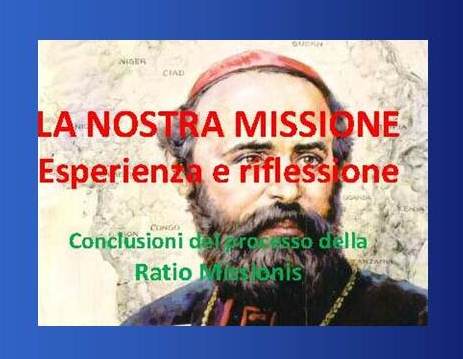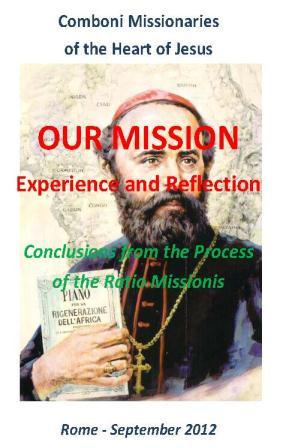Daniel Comboni
Comboni Missionaries
Institutional area
Other links
Newsletter
Rome, Monday, January 7, 2013
OUR MISSION: Experience and Reflection. Conclusions from the Process of the Ratio Missionis. We publish attached the final version of the Ratio Missionis in English, French, Italian, Portuguese, German and Spanish.
LETTER OF PRESENTATION OF THE RATIO MISSIONIS
“Always be prepared to give an answer to everyone who asks you to give the reason for the hope that you have”
(1Pt 3,15)
Dear brothers,
Our Rule of Life reminds us that “Daniel Comboni distinguished himself for his total dedication to the missionary cause for which he spoke, worked, lived and died” (RL 2), and that our Institute “is entirely dedicated to missionary service. This determines its activities, life-style, and organization, as well as the preparation of its candidates and the renewal of its members” (RL 2.1).
Fidelity to mission has been the guiding principle of our history which now stretches back over 150 years. And it is this fidelity which leads us to an attitude of constant listening to the signs of the times and to constant renewal. As again our Rule of Life says, the Comboni Missionaries, “publicly commit themselves to a particular way of life in order to fulfil better the missionary service in mutual responsibility and edification. Aware that they respond to this call in an inadequate and uneven fashion, they accept the necessity of constantly revising their way of life in order to live in the world as a sign of salvation” (RL, Preamble).
It is in the context of this fidelity to, and constant renewal of, our Comboni charism that the Ratio Missionis, which has occupied us as an Institute since 2003, finds its place.
The aim of this process was less that of drawing up a normative document (similar, for example, to the Ratio Fundamentalis), than of stirring us all into a movement of renewal understood in the widest sense, and including our theological motivations, spirituality, methodology, fields of mission, and community life. The experience thus lived has now become part of our missionary journey as individual persons and as Institute.
The process has also generated important questions, affirmations, reflections, experiences, proposals and suggestions, which the XVII General Chapter thought it right to gather, organise and offer to the whole Institute. In practical terms, the Chapter asked the General Council to name a commission that “in collaboration with the SGEV, might undertake a systematic re-reading of the material produced in the last few years during the process of the Ratio Missionis. The theological reflection on mission and on Comboni methodology that emerges from it will be presented at the next Intercapitular” (CA ’09, 11.1).
This commission, coordinated by the General Secretary for Evangelisation, worked very well, and drew up a document, which was presented to the Intercapitular Assembly and which is now published here under the title Our Mission. Experience and Reflection. Conclusions from the Process of the Ratio Missions.
The word “ratio” may be understood with different meanings. The sense which seems most appropriate to our case is that found in 1 Peter 3.15, where it is said that the Christian must “always be prepared to give an answer to everyone who asks you to give the reason (ratio, logos, in the Latin and Greek respectively) for the hope that you have”. So ratio has to do with giving the reason, the deepest motivation, for what one is and does. The Ratio Missionis, then, has to with saying what we do, and how and why we do it; it is an effort to define, that is, what mission means for us, the Comboni Missionaries of the 21st century, and the implications of this in terms of our attitudes, our criteria and our choices.
The document now in our hands is, naturally, unfinished, because it needs to be contextualised in the various situations where mission has led us. It is unfinished also because mission never stops, especially in these times of rapid change: reflection on mission must continue. In this sense, the Ratio Missionis will always be a dynamic process, because every historical change demands a redefinition of mission in all its various aspects.
Finally, as long as our Institute still seeks to say, at times also amidst resistance and opposition, what it means for us to be missionaries in a particular context and epoch - to elaborate, that is, a Ratio Missionis, then we will know that the Comboni Institute is still alive, and that mission is still capable of setting us on fire with passion and life.
In presenting this document to you, we want to thank the Commission who worked on it and all those who cooperated along the way. At the same time, we express the hope that it will help us to nourish in ourselves the missionary passion of the Founder, aware that “the Spirit who raised in Comboni a love for the people of Africa, continues to guide us towards the poor and the forgotten” and that “it is the same Spirit that pushes us to a deep personal and community renewal in love – a gift received and lived as consecration, unveiled and offered in the mission” (CA ’09, 19).
The General Council:
Fr. Enrique Sánchez González
Fr. Alberto Pelucchi
Fr. Tesfaye Tadesse Gebresilasie
Fr. Villarino Rodríguez Antonio
Bro. Daniele Giusti





